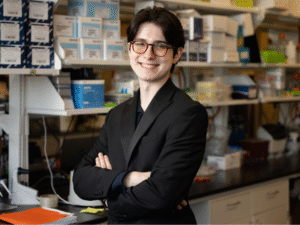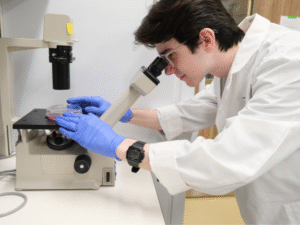Researchers Find COVID Vaccine Boosts Immunotherapy Response and Survivability
HOUSTON, Oct. 20 – A University of Houston biology student played a pivotal role in a groundbreaking discovery by researchers at MD Anderson Cancer Center: the COVID vaccine can enhance the effectiveness of immunotherapy treatments, offering new hope to cancer patients worldwide.
In a new study presented Oct. 19 at the 2025 European Society for Medical Oncology Congress, researchers revealed patients who received mRNA-based COVID vaccines within 100 days of starting immunotherapy were twice as likely to be alive three years after treatment as those who didn’t receive the vaccine.
“This study demonstrates that commercially available mRNA COVID vaccines can train patients’ immune systems to eliminate cancer,” said Adam Grippin, M.D., Ph.D., senior resident in radiation oncology at MD Anderson and co-author of the study. “When combined with immune checkpoint inhibitors, these vaccines produce powerful antitumor immune responses that are associated with massive improvements in survival for patients with cancer.”
A Transformational Discovery
Cole Woody, a junior biology major from Sugar Land whose research at the UH Sequencing Core focuses on the development of potential cancer vaccines through chimeric RNAs – and, more specifically, how cancers can be more aggressively targeted by a vaccine – was already working in the lab at MD Anderson when Grippin asked him to join his team.
Woody was tasked with helping to validate the team’s hypothesis by demonstrating that there was a significant increase in cancer-targeting T cells – the immune cells responsible for recognizing and destroying tumors – following vaccination. To confirm the findings, he designed and used custom antibodies to detect cancer-specific T cells, a critical step in demonstrating how the vaccine strengthens the body’s immune response to treatment.
“We saw a very noticeable increase in antigen-specific T cell populations in the vaccinated group,” Woody said. “It was the kind of result you hope for in research — clear, measurable evidence that could one day help improve patient outcomes.”
The discovery could be a game-changer as it points to the possibility that widely available, low-cost vaccines have the potential to dramatically improve the effectiveness of certain immune therapies.
While this study focused on two types of cancer, Woody says the positive impact could be much wider.
“We’re trying to understand which cancer types are seeing the biggest benefit — is it just non-small cell lung cancer and melanoma, or can this apply to other cancers with similar immune evasion mechanisms? If we can extend this to a broader patient population, that would be phenomenal,” he said.
UH a Rising Research Powerhouse
Being a part of this transformational research is yet another milestone in what has already been a remarkable year for Woody, who earned both the Barry Goldwater Scholarship and the Phi Beta Kappa Key into Public Service — two of the nation’s most prestigious academic honors.
“Cole Woody is yet another example of the exceptional students at the University of Houston,” said Diane Chase, UH senior vice president for academic affairs and provost. “His passion for research, science and community service have earned him prestigious accolades. Now, he is contributing his talents to groundbreaking discoveries alongside MD Anderson researchers. We’re proud of his accomplishments and look forward to his further successes as a student, scholar and scientist.”
It also furthers UH’s emergence as a global leader in health and biomedical research, where students are provided with unmatched opportunities to engage in cutting-edge science – opportunities that Woody says are key to his success.
“The University of Houston is unique in the way it’s positioned within Houston — you’re so close to the world’s largest medical center and having that proximity to interact with the labs there is a huge resource for students,” Woody said. “But UH also gives you a strong foundation in research. I wouldn’t have been able to succeed at MD Anderson or places like NIH or Harvard without the training I received here.”
**Captions for attached photos
1. UH biology student Cole Woody works in a lab at MD Anderson Cancer Center
2. UH biology student Cole Woody
About the University of Houston
The University of Houston is a Carnegie-designated Tier One public research university recognized with a Phi Beta Kappa chapter for excellence in undergraduate education. UH serves the globally competitive Houston and Gulf Coast region by providing world-class faculty, experiential learning and strategic industry partnerships. Located in the nation’s fourth-largest city and one of the most culturally rich regions in the country, UH enrolls nearly 49,000 students.







